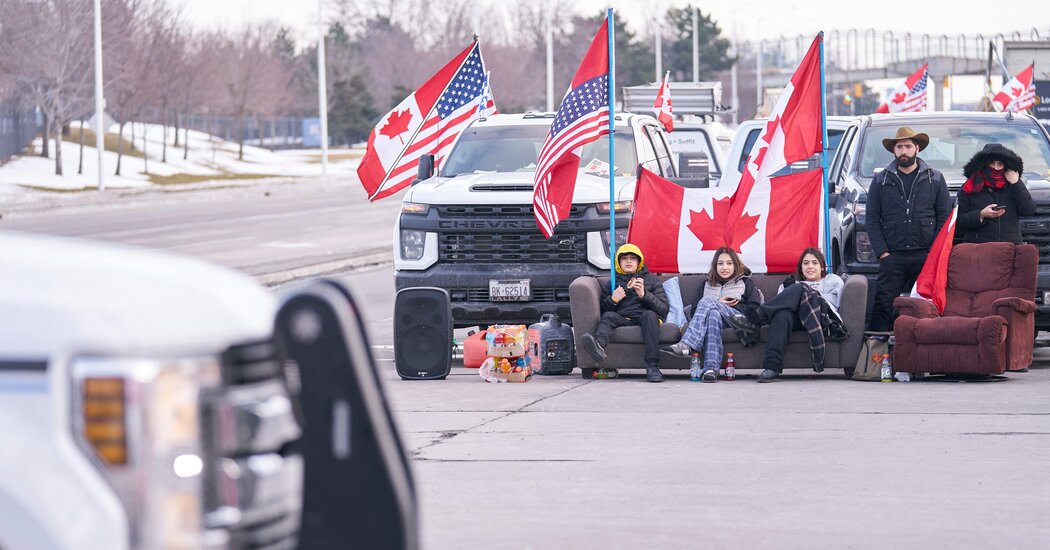
General Motors is the latest automaker to suspend production because of protests at a crucial Canadian border crossing that have disrupted supply chains already in turmoil because of the pandemic.
G.M. said it had canceled two shifts on Wednesday and Thursday at a factory in Lansing, Mich., that makes sport utility vehicles. The plant depends on components that normally travel across a bridge between Windsor, Ontario, and Detroit that was closed by truck drivers and far-right groups angry about vaccine mandates and demanding the resignation of Prime Minister Justin Trudeau.
Ford Motor and Toyota have also shut down some operations because factories could not get parts manufactured in Canada.
The shutdown at the border will prevent manufacturing at Toyota’s three Canadian plants for the rest of this week, Scott Vazin, a spokesman for Toyota Motor North America, said Thursday.
As long as the shutdowns are short lived, the impact on automaker sales and worker livelihoods should be limited. Companies are likely to make up for any lost production by running extra shifts or other measures.
“A couple of days shouldn’t be that significant,” Mr. Vazin said. “We’re certainly hoping the blockade ends.”
Said Deep, a spokesman at Ford, said Thursday morning that the company was running its plants in Oakville and Windsor, both in Ontario, at reduced capacity.
“This interruption on the Detroit-Windsor bridge hurts customers, autoworkers, suppliers, communities and companies on both sides of the border that are already two years into parts shortages resulting from the global semiconductor issue, Covid and more,” Mr. Deep said. “We hope this situation is resolved quickly because it could have widespread impact on all automakers in the U.S. and Canada.”
John Bordignon, a spokesman for Honda Canada, said on Thursday that the company’s plant in Alliston, Ontario, would suspend one production line during the day shift on Friday.
“As this remains a fluid situation, we are monitoring the disruption of transportation between Canada and the U.S. and will adjust production as necessary,” Mr. Bordignon said.
Protesters challenging Canada’s vaccine requirements and other pandemic restrictions began cutting off traffic Monday on the Ambassador Bridge, the vital span that connects Detroit and Windsor.
The bridge accounts for roughly a quarter of the trade between the United States and Canada. Trucks carry an estimated $300 million worth of goods across the bridge each day, about a third of which are related to the automobile industry.
Companies have begun rerouting shipments to alternative crossing routes, like the Blue Water Bridge, which links Port Huron, Mich., and Sarnia, Ontario. But a new blockade on Wednesday on a route to that bridge, as well as a surge of diverted cars and trucks, slowed traffic there.
The closings are likely to lead to losses for other industries, as well. On Wednesday, Jen Psaki, the White House press secretary, said that the Biden administration was tracking potential disruptions to agricultural exports to Canada.
Gretchen Whitmer, the governor of Michigan, said in a statement on Thursday that the blockade was putting the state’s economy at risk.
“The blockade is having a significant impact on Michigan’s working families who are just trying to do their jobs,” she said. “Our communities and automotive, manufacturing, and agriculture businesses are feeling the effects.”
Carmakers worldwide have struggled with shortages of semiconductors and other parts that severely curtailed production and sales. They had hoped that the flow of components and materials would start to return to normal this year.
Ford said last Friday that it would be forced to shut down some production lines and reduce work hours at plants across North America this week because of chip shortages.
Most carmakers operate on a “just-in-time” system that dispatches parts and materials to their factories as they are needed. The system has helped manufacturers reduce costs.
But it has also left companies vulnerable as the pandemic closed foreign ports and factories and overloaded shipping companies, warehouses and truckers.
David C. Adams, the president at Global Automakers of Canada, which represents Toyota and Honda, said auto facilities typically had about two days of inventory on hand. “Then things start to become problematic in terms of having enough parts to keep the lines running.”



